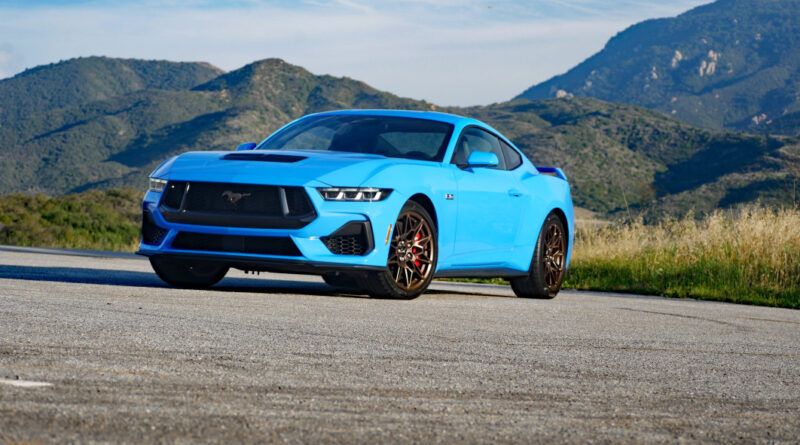2024 Ford Mustang Review: Not entirely new, but definitely improved
Pros: Big power from all engines; many flavors; available convertible; just-for-fun features including Drift Brake and customizable displays; spacious trunk
Cons: 10-speed auto not performance-oriented enough; limited customization of drive mode settings; rough ride with Performance pack; Convertible cowl shake
With carmaker budgets increasingly going to electrification efforts, there have been numerous examples of models getting quasi-redesigns. The 2024 Ford Mustang is one of them. While Ford is calling it the seventh-generation Mustang, the underpinnings are shared with the old one, and you don’t have to look too closely to see the similarities in proportion and specification. It seems a lot more like the mid-generation changes for 1971, 1987 or 2010.
Ultimately, though, whatever. The truth is, the outgoing Mustang was so good that a from-scratch redo wasn’t necessary. If anything, Ford could’ve just kept the status quo for a few more years. Instead, we get updated styling that’s more aggressive with sharper body lines and blacked-out detailing around the grille (one of its more controversial details). The interior sees the most significant and arguably necessary update, doing away with retro looks (apart from the totally rad “Fox Body” gauge design option) in favor of one that’s more modern and tech-focused without simply sticking a giant screen to the dash and calling it a day (unlike another Mustang).
Ford’s renowned Coyote V8 gets 30 more horsepower in the GT, and manages a cool 500 hp in the new, range-topping Dark Horse that replaces and betters the Mach 1. The 2.3-liter EcoBoost gets an extra 5 horsepower, and there’s no longer a “High Performance Package (HPP) variant.” It’s now exclusively equipped with the 10-speed automatic, though a six-speed manual remains a (fantastic) option with the V8. And speaking of maxing out on fun behind the wheel, the 2024 Mustang introduces a pair of just-for-the-helluvit features: the Remote Rev function that lets you rev the engine with the key fob, and the wildly fun drift brake.
There are plenty of other less noticeable updates for 2024, including a more composed suspension, a quicker steering rack and various smaller engine improvements beyond “more power.” It all adds up to a better Mustang, if not an entirely new one. Now, we’d normally take this opportunity to compare the car in question to others in the segment, but both the Camaro and Challenger have ceased production, leaving the original Pony car as the final Pony car (for now at least). Let’s just take a moment, then, to say that a quasi-redesign is definitely better than cancellation.
Interior & Technology | Passenger & Cargo Space | Performance & Fuel Economy
What it’s like to drive | Pricing & Trim Levels | Crash Ratings & Safety Features
What’s new for 2024?
The Mustang was redesigned for 2024. You can read about those changes in brief above or in detail in our 2024 Ford Mustang First Drive Review.
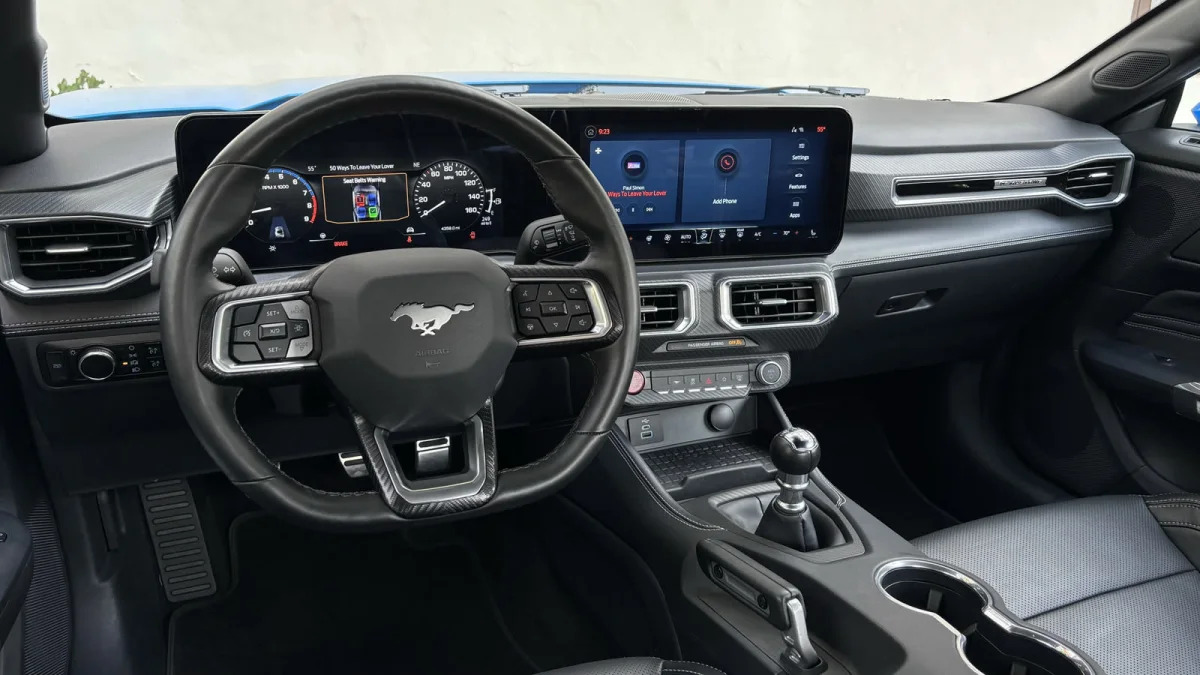
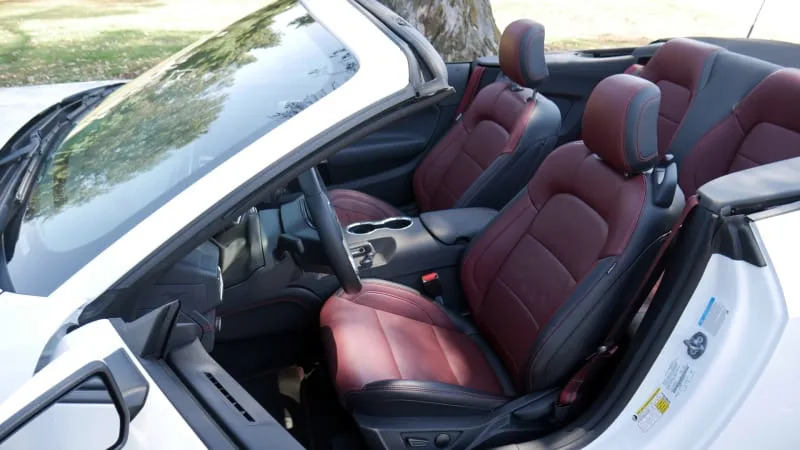
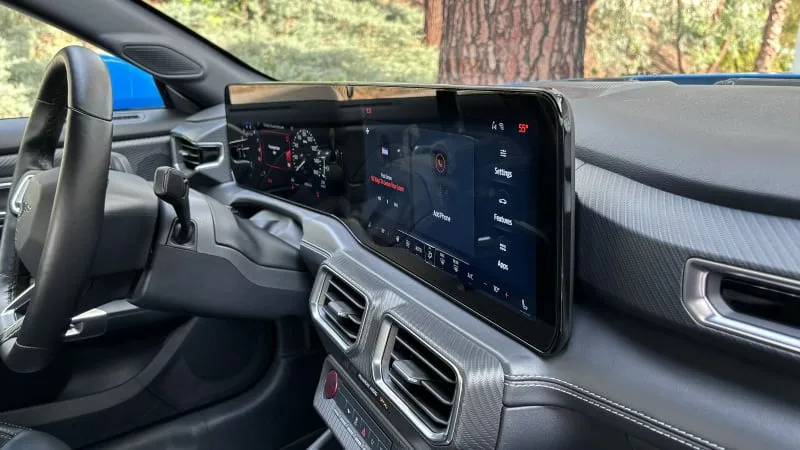
What are the Mustang interior and in-car technology like?
Although some retro touches remain, the 2024 Mustang has a modern interior in both appearance and functionality. It is dominated, as so many cars are these days, by two giant screens, optionally connected by one piece of glass – base models split the displays into free-standing screens – that wrap toward the driver for a more cockpit-like design. The gauge cluster offers four designs, with three of them further customizable by providing roughly 30 color choices you can mix and match in two-tone combinations. Things can get tacky. The final design mimics the analog gauges of the third-generation “Fox Body” Mustang sold from 1987 to 1993. They are very cool and also the most legible of all the options.
As for the 13.2-inch infotainment touchscreen, it runs off Ford’s existing Sync 4 architecture, but features an all-new interface and widescreen orientation. Ford got rid of most physical entertainment and climate controls because replacing them with touchscreen controls was “popular in research with Millenials, Gen-Z and traditional Mustang drivers alike.” Sure it was. Luckily, the climate controls and a bank of menu icons remain docked on the screen, including when using Apple CarPlay or Android Auto. As far as all-screen interiors go, this seems like one of the best. It really does look slick, too. A wireless charge pad is available, and a USB port can be added behind the rearview mirror for track cameras “and other devices.”
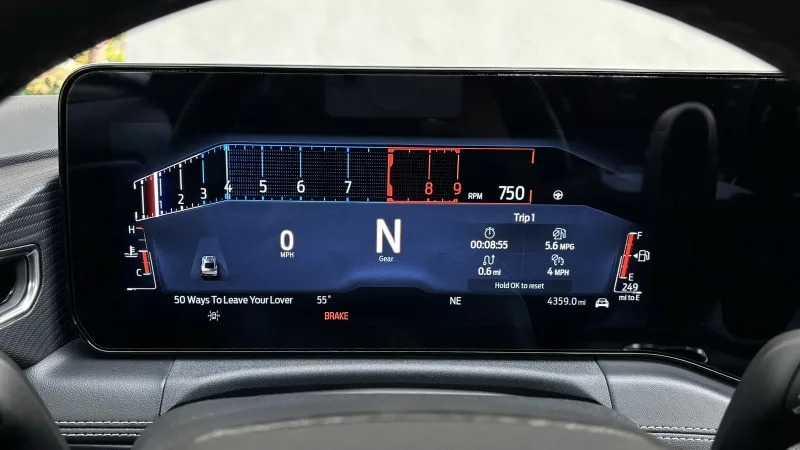
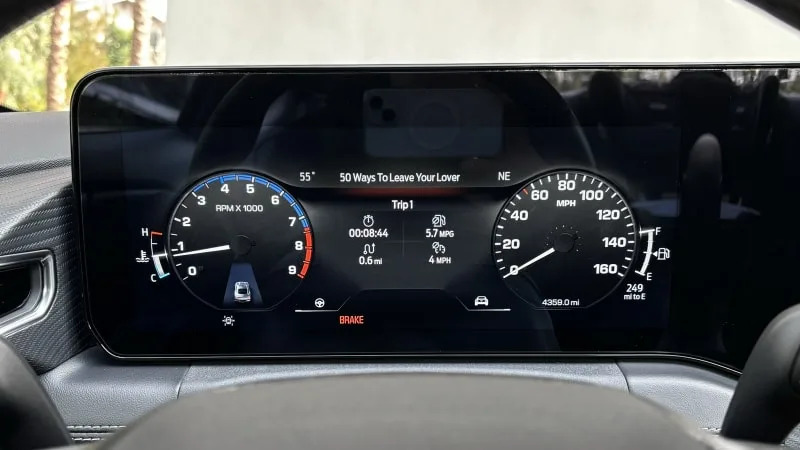
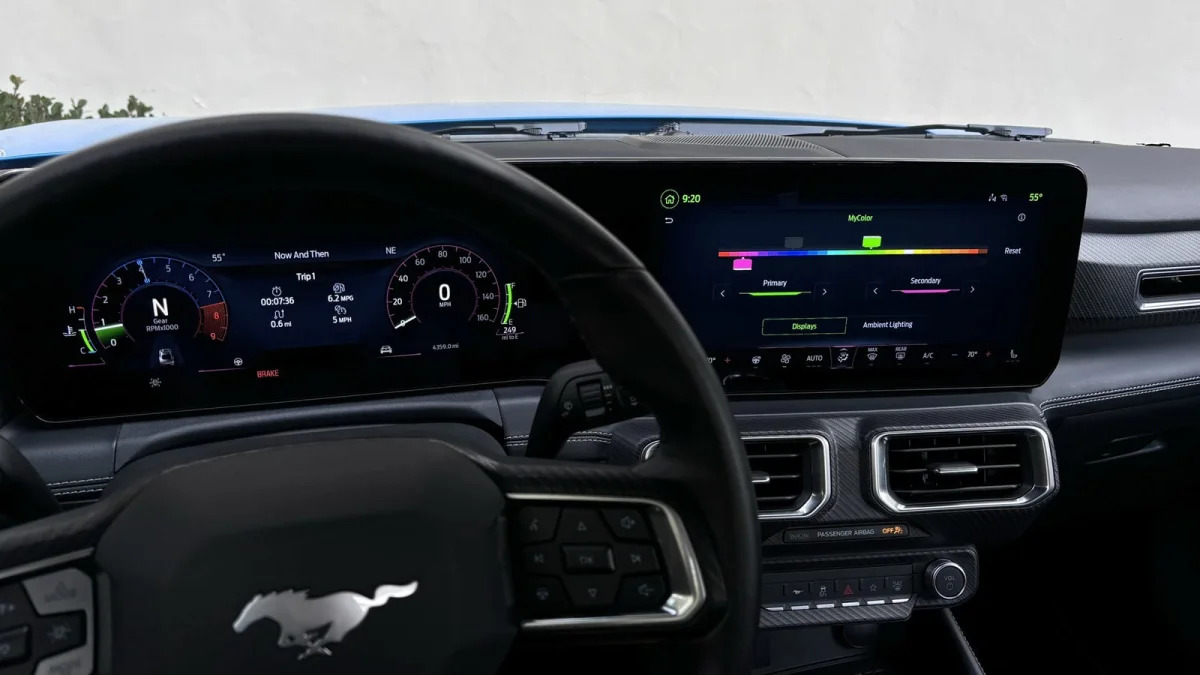
How big is the Mustang?
By sport coupe standards, the Mustang is quite large. When hustling it along a tight mountain road, you’re always aware of its sizable footprint and not insignificant weight. Then again, it’s not a sports car, it’s a muscle car.
Inside, the driver will find abundant front seat adjustment, along with sufficient headroom for those well above 6 feet tall. Those on the extreme ends of the height spectrum may want to think twice about the optional Recaro seat option, though. They are manually adjustable and don’t move in as many ways as the standard seats, meaning tall drivers may have insufficient under-thigh support and short passengers may find themselves staring at the dash. The standard seats remain a bit too squishy and still don’t offer power recline.
One of the reasons for the latter omission is to make it quicker to access the back seat. Not that you’re likely to do that very often considering it’s best suited to bags and small dogs. We did manage to fit a large, forward-facing child seat in the back of a coupe, and it wasn’t a completely ridiculous endeavor.
As for the trunk, the coupe’s is surprisingly large at 13.3 cubic-feet and it came ever-so-close to acing our luggage test. The convertible loses 3 cubes, but 10.3 cubic-feet is still pretty good for a drop-top.
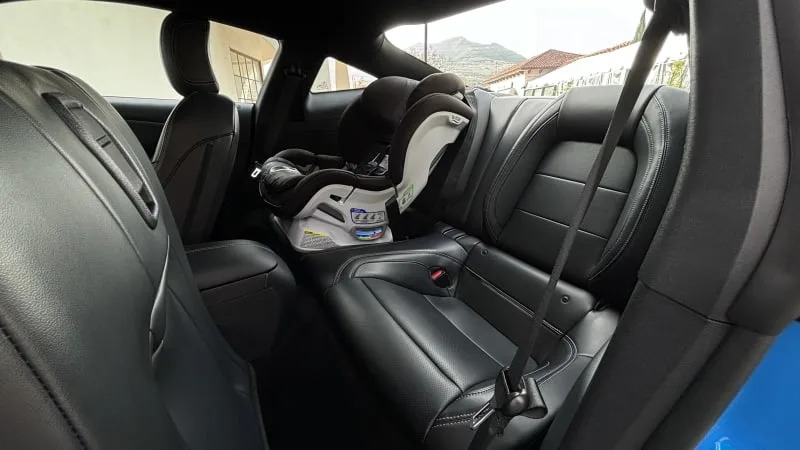
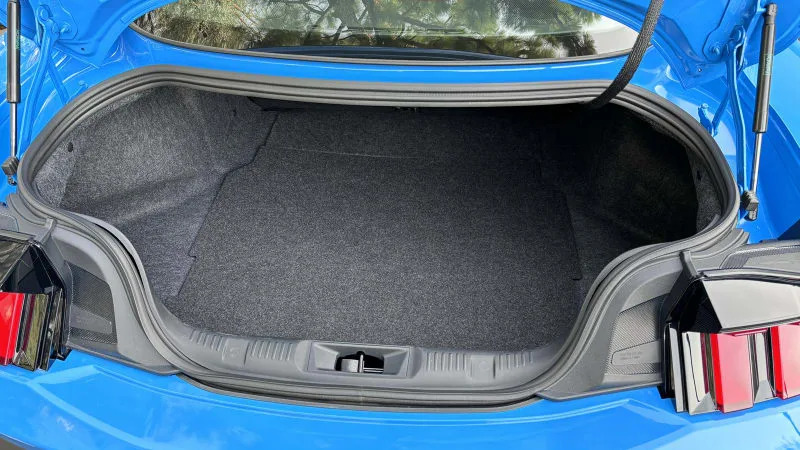
What are the Mustang fuel economy and performance specs?
The Mustang EcoBoost has a 2.3-liter turbocharged inline-four that produces 315 horsepower and 350 pound-feet of torque. That smokes many past Mustang V8s. The only transmission available is a 10-speed automatic, and a limited-slip differential comes standard. Fuel economy comes in at 22 mpg city, 33 mpg highway and 26 mpg combined, which is pretty darn good for a Mustang. It falls to 21/29/24 with the High Performance Package. As we said up high, there’s no longer a more powerful EcoBoost High Performance Package (HPP) variant, but confusingly there is a High Performance Package option that includes a limited-slip rear axle, the Drift Brake, chassis tuning and some other goodies.
The Mustang GT has a 5.0-liter V8. Hell yeah. It produces 480 hp and 415 lb-ft of torque in standard guise, or 486 hp and 418 lb-ft with the optional active valve exhaust. The 10-speed auto is optional, while a six-speed manual transmission is standard. It includes an automatic rev-match downshift function and hill-start assist. Fuel economy falls to 15 mpg city, 24 mpg highway and 18 mpg combined with the auto, and 14/23/17 with the manual. We averaged around 16 mpg in a week of mixed driving with a manual GT, including 250 miles of free-flowing highway travel.
The Mustang Dark Horse also has a 5.0-liter V8, but thanks to some stronger engine internals, improved intake and a computer tweak, produces 500 hp and 418 lb-ft of torque. Seeing “500” is admittedly pretty cool, but that’s still only 14 horses more than the best GT. It also comes with the 10-speed automatic, but its six-speed manual option is a different, more performance-oriented Tremec unit previously used in the Shelby GT350. Fuel economy stands at 14/22/17 regardless of transmission.
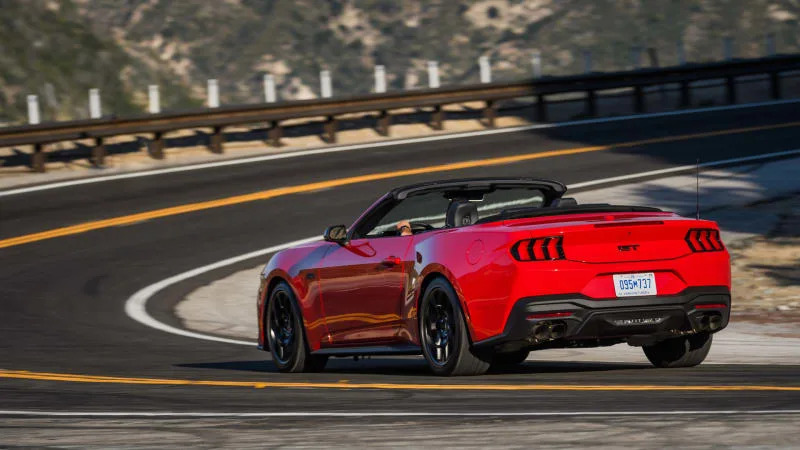
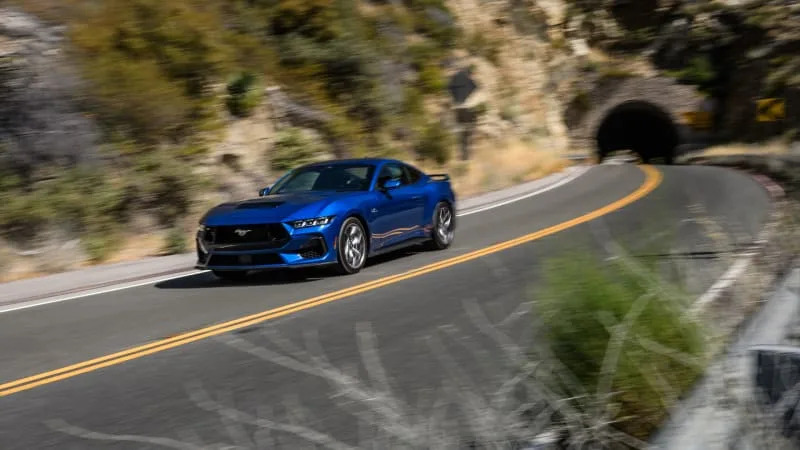
Mustang GT Convertible and Coupe
What’s the Mustang like to drive?
There are so many different variations and options that can fundamentally change how the Mustang drives, we’re going to do something a bit different here and provide some specific observations that might point you in the direction of one version over another.
- Don’t dismiss the EcoBoost. It may not sound as good as a V8, but it has more power than plenty of old Mustang V8s, and it has absolutely no problem getting the tires smoking.
- Speaking of which, the Drift Brake is wildly, laugh-out-loud fun. Make sure to use it in a safe place, but man, what a riot. You can read about it more here.
- Think twice about the GT’s Performance Pack. Yes, it sharpens the handling and improves the brakes, but ask yourself how much will that matter if it’s your daily driver. We suspect it won’t matter as much as the resulting rough ride, even with the package’s magnetically controlled dampers (that really should offer a softer setting). This is all made worse in the Convertible, which suffers from constant cowl shake as a result.
- Seriously consider getting the manual transmission. It’s easy and engaging to use, especially with its auto rev-matching function. The automatic just isn’t up for duty in a performance car, and worse, it doesn’t come standard with paddle shifters.
- The Mustang offers lots of drive modes and six custom settings, but nothing lets you pair a softer suspension setting with more aggressive throttle, transmission, steering and stability/traction settings – something beneficial on real-world, bumpy roads that can upset a chassis with a too-firm suspension.
- We’ve had mixed thoughts about the Mustang steering, and it seems like driver preference will probably determine how you feel about it, too.
- You can read our in-depth Mustang Dark Horse review here. In short, though, we’re not sure the Dark Horse is really so much better than a loaded GT with the Performance pack that it works out to be a worthwhile upgrade for the money. Especially if you intend it to be your daily driver. Really, you’re just adding stiffer springs, 14 horses and the much-improved six-speed trans (if you get it at all). That’s not nothin’, but it’s a comparison to consider, for sure.
What other Ford Mustang reviews can I read?
2024 Ford Mustang GT & EcoBoost First Drive Review: You want silly? It gives you silly
Our first drive of the 2024 Mustang, including the most in-depth driving impressions of the four- and eight-cylinder versions, plus the coupe and convertible.
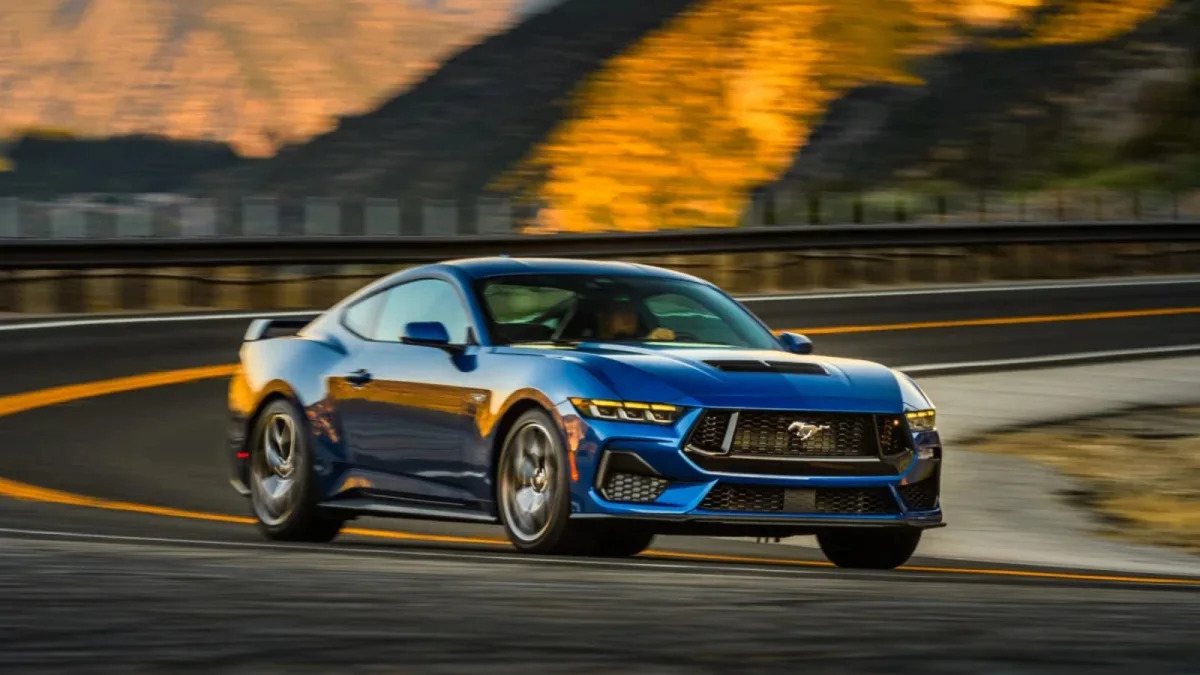
2024 Ford Mustang Dark Horse First Drive Review: New model, familiar formula
The new range-topping Mustang is not without its charms, but we find its advantages over a top-notch GT to be limited.
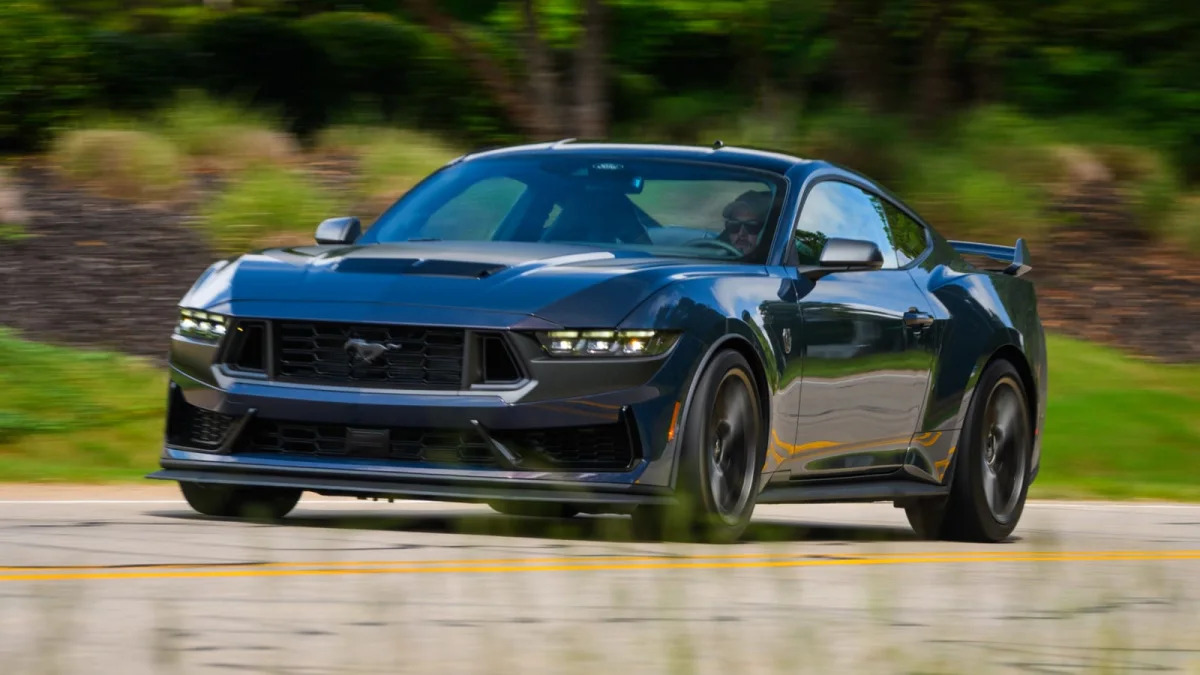
The 2024 Ford Mustang has a drift brake. It. Is. AWESOME!
What the headline says. Read all about one of the coolest things I’ve experienced in a new car in a very long time.
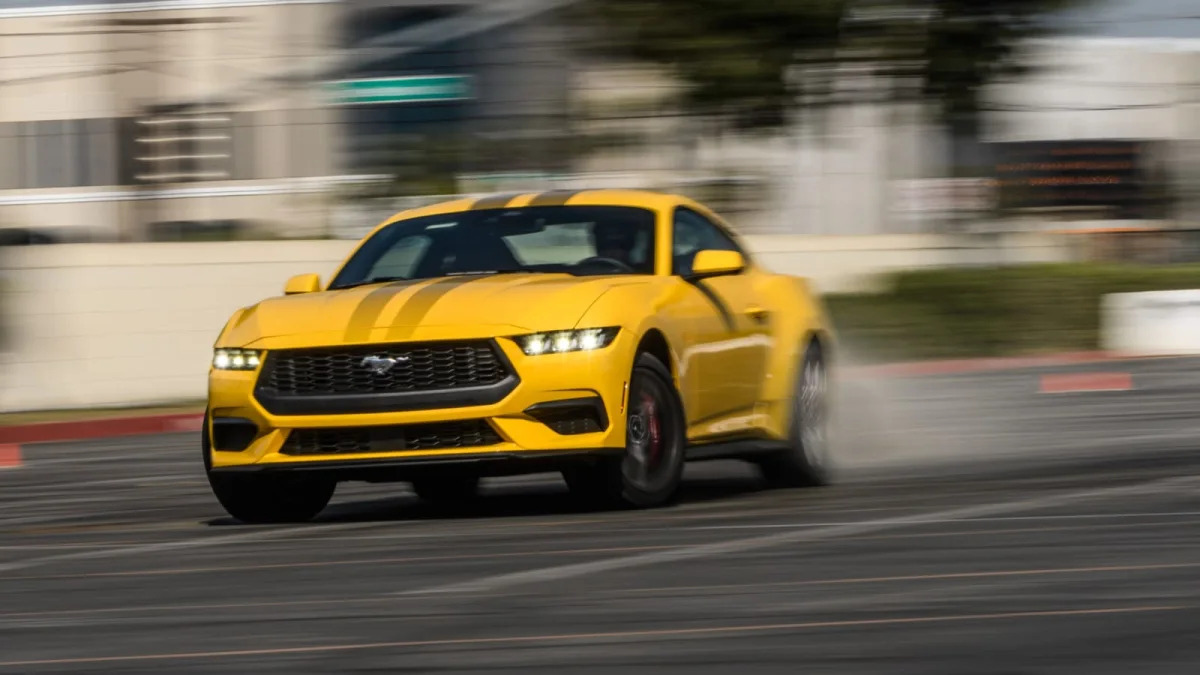
Ford Mustang Luggage Test
Once again, the Mustang wows with a trunk far bigger and more useful than you’d expect from a coupe.
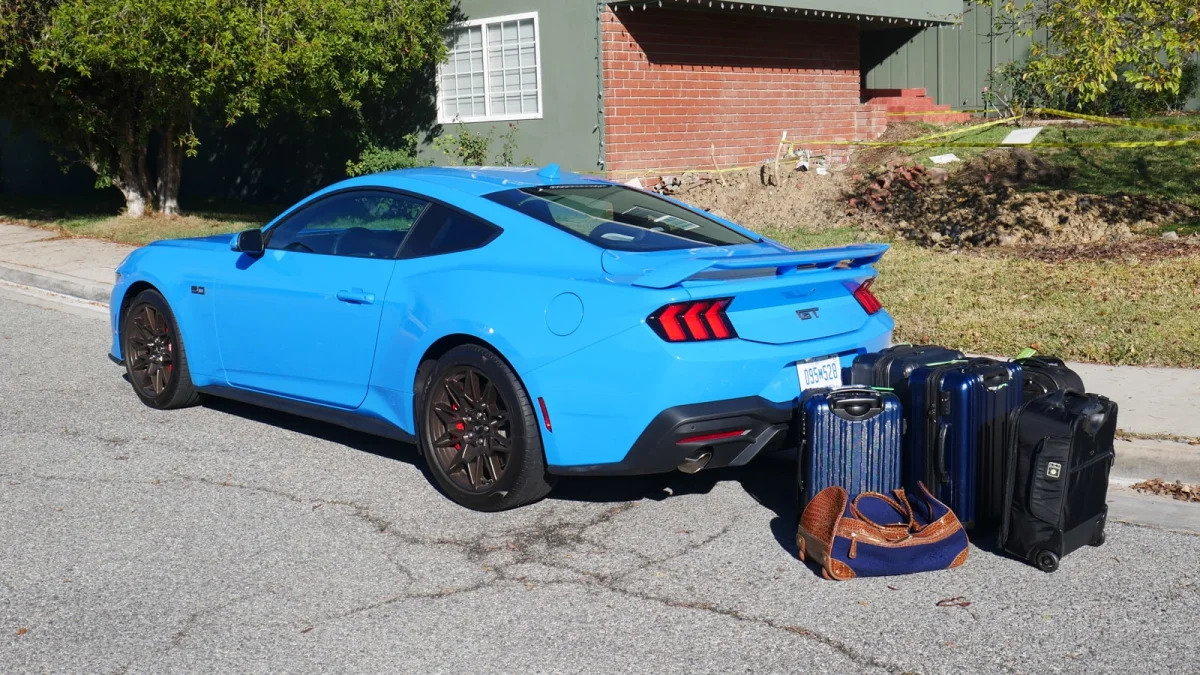
What is the 2024 Mustang price?
Prices start at $33,160 for the coupe and $39,020 for the convertible, both of which include the absurdly hefty $2,240 worth of destination and acquisition fees. All prices below include those fees, and note that an automatic transmission is a $1,595 option for the GT and Dark Horse.
Mustang Coupe Prices
EcoBoost: $33,160
EcoBoost Premium: $38,685
GT: $44,950
GT Premium: $49, 470
Dark Horse: $61,725
Dark Horse Premium: $65,720
Mustang Convertible Prices
EcoBoost: $41,260
EcoBoost Premium: $44,185
GT Premium: $54,970
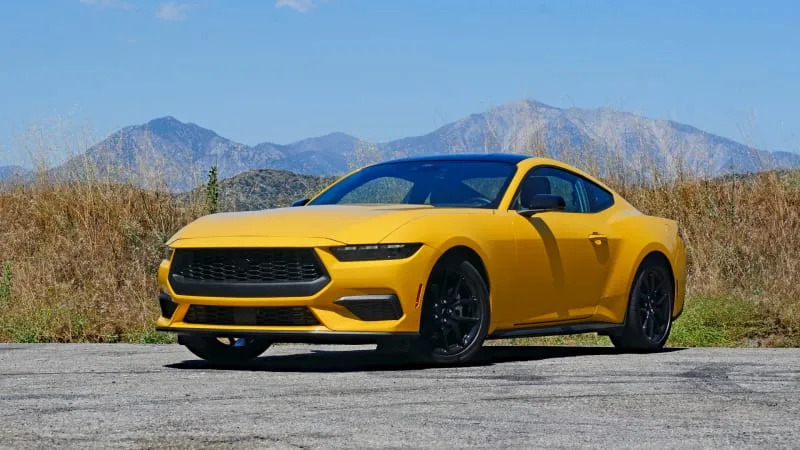
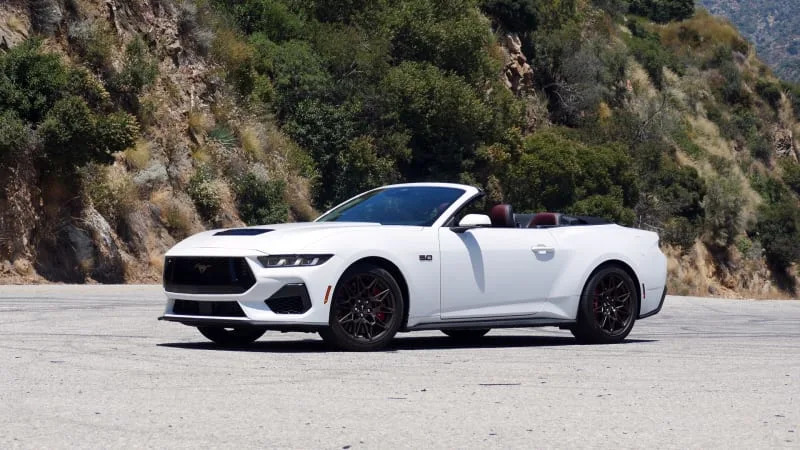
Mustang EcoBoost Coupe and Mustang GT Convertible with Performance Package
What are the Mustang safety ratings and driver assistance features?
Every Mustang comes standard with Ford’s Co-Pilot360 suite of driver assistance features. These include forward collision warning with automatic emergency braking and pedestrian detection, lane-keeping assist, blind-spot and rear cross-traffic warning, rear traffic vehicle exit warning, and post-impact auto braking. The Co-Pilot 360 Assist+ package available on the Premium trims adds evasive steering assist and adaptive cruise control with stop-and-go capability (that particular element is understandably only included with an automatic transmission).
The 2024 Mustang had not been crash tested by a third party at the time of this writing.

